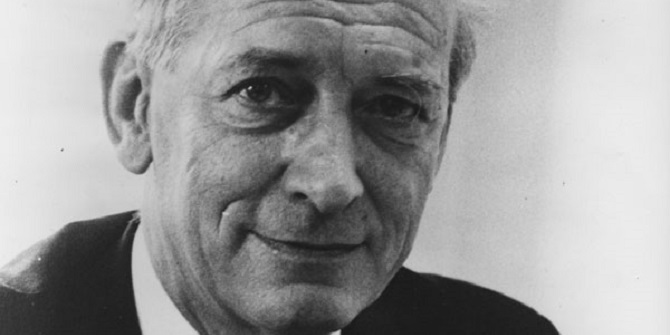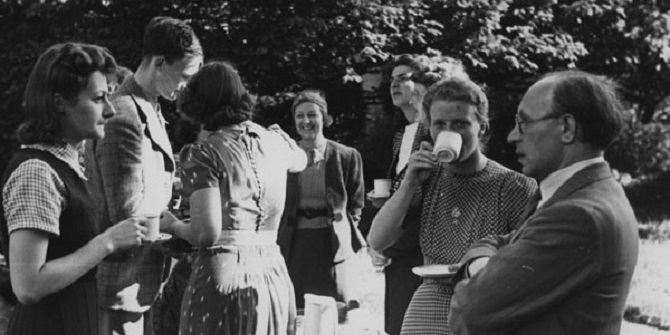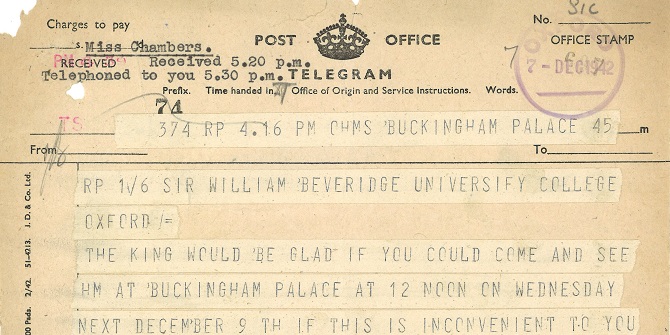Harold Cecil Edey (1913–2007) joined the Department of Accounting as a Lecturer in 1949 and retired as Professor Emeritus in 1980. And, during his thirty-year tenure at the LSE, Edey served as the School’s first Pro-Director in 1967. Today, a portrait of Edey by Sara Rossberg hangs on the walls of the Department of Accounting on the third floor of the Old Building. LSE alumnus and accounting historian, Martin E Persson, looks at Edey’s contribution to the teaching of accounting at the School in the late 1950s.
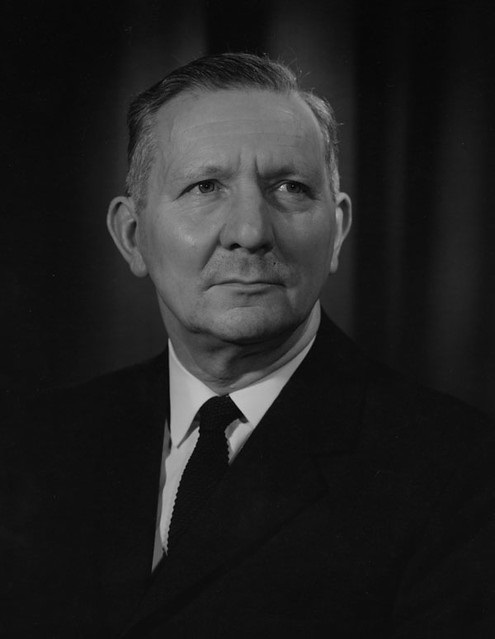
Edey was born in South London in 1913. He articled with a small London based accounting firm, and he qualified as a Chartered Accountant with the ICAEW in 1935. The following years were spent working as a CA and then serving in the Royal Naval Volunteer Reserve during the war effort. After the defeat of Germany, he returned to London and completed a B Commerce degree at LSE in 1947. His performance in the coursework led to an appointment as a research assistant to the LSE economist Frank Paish, which culminated in a full-time appointment as a Lecturer in 1949.
At LSE, Edey joined colleagues David Solomons and William T Baxter. These three individuals came to form what Professor Geoffrey Whittington at Cambridge has referred to as the LSE Triumvirate for their role in shifting British accounting thought from one rooted in practice to one that drew insights from the field of economics, and in particular the writings of colleagues such as Friedrich Hayek, John Hicks, Lionel Robbins, and Ronald Coase.
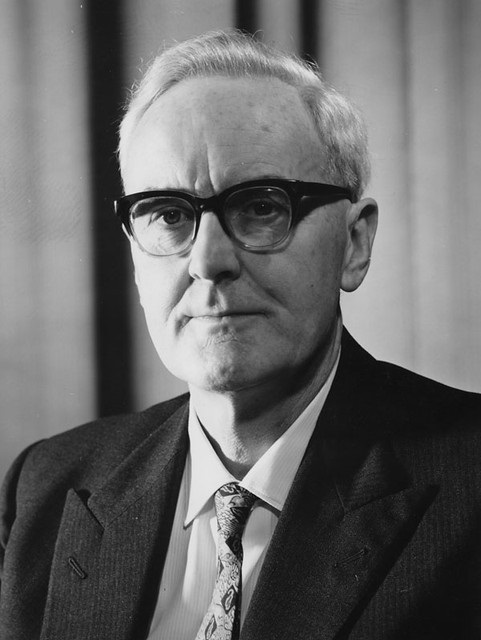
During his tenure at LSE, Edey participated in the establishing of the Department of Accounting in 1962 and the offering of the first UK MSc program in accounting in 1967. He was promoted to full Professor in 1962 and the School’s first Pro-Director in 1967. Edey also served in various capacities outside of his home institution, such as a member on the board that led to the establishment of the London Business School. Edey retired as Professor Emeritus in 1980. He passed away in 2007.
The LSE Triumvirate’s effort to integrate ideas from economics into the accounting curriculum required them to produce much of the School’s teaching material from scratch. One of the more peculiar items to emerge from this program was a one-act play written by Edey in the late 1950s. Third-year undergraduate students performed the play during an annual residential course, which was then held at Beatrice Webb House in Dorking.
The one-act play is about the difficulties of measuring income, and the appropriate amount of taxation on that income, during periods of inflation. It is set in the Chamber of a Profits and Tax Tribunal, in the principal City of Mars, in the year 1960. The plaintiff is the Tax Authority and the Trans-Martian Canal Company is the defendant. The plaintiff is suing the defendant over its calculation of income, the result of which has minimised the amount of taxes due to the government.
When performing the play, students assumed one of nine different roles, each one with their views on the correct measurement of income and the associated tax. Hector the Tax Inspector – a name coincidentally later used in advert campaigns for HMRC in the 1990s – represented the plaintiff and argued for measurements that would lead the Trans-Martian Canal Company to calculate higher income and corresponding tax. Mr Clearsighted, a Chartered Accountant, represented the defendant and argued for keeping the current method of calculation. There was also an economist, Professor Dreamy, as well as three expert witnesses and three commissioners overseeing the proceedings of the tribunal.
Edey was fascinated by astronomy and science fiction, an interest he shared with his colleague Sir Bryan Carsberg. This interest is what led him to choose Mars as the setting for his one-act play, and a popular BBC radio drama, Journey into Space, is likely to have served as the inspiration for the choice to focus on canal construction. The second season of this drama, The Red Planet, follows a group of astronauts as they discover giant alien-built canals that stretch across Mars’ surface. The radio drama, in turn, had borrowed the idea of giant channels on Mars surface from claims by the Italian astronomer Giovanni Schiaparelli in 1877 (his observations were later attributed to an optical illusion due to limitations in early telescopes, but the idea remained popular in science fiction).

Edey’s one-act play was written to contrast different viewpoints on the appropriate calculation of income, and it is therefore fitting that it does not reveal the outcome of the proceedings in the Chamber of the Profits and Tax Tribunal. This tension, however, puts it in contrast to most contemporary accounting textbooks, which tend to shy away from contentious areas in favour of a uniformed presentation of accounting methods. The rediscovery of this play offers new insights into the teaching of accounting at LSE in the 1950s, and the author hopes that its publication will bring about more teaching material of this kind.
Abridged from Martin E Persson and Stephan Fafatas’ article “Accounting Measurements, Profit, and Loss: A Science Fiction Play in one Act by Harold C Edey.” See the original article for an unabridged version that includes the full one-act play and references. Martin E Persson also has an edited volume of Edey’s unpublished work, “Harold Cecil Edey: A Collection of Unpublished Material from a 20th Century Accounting Reformer,” forthcoming with Emerald Publishing on November 18, 2019.
Resources
The Harold C Edey Collection, Archives and Special Collections, British Library of Political and Economic Science


